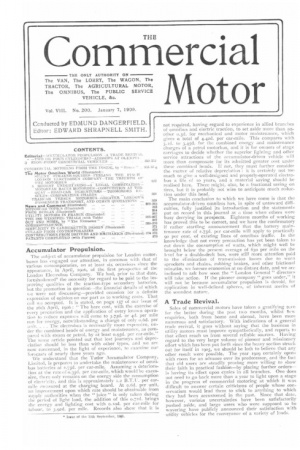Accumulator Propulsion.
Page 1

If you've noticed an error in this article please click here to report it so we can fix it.
The subject of accumulator propulsion for London motorbuses has engaged our attention, in common with that of various contemporaries, on at least six occasiowi since the appearance, in April, 1900, of the first prospectus of the London Electrobus Company. We had, prior to that date, foreshadowed* the necessity for regard to be paid to the improvingqualities of the traction-type secondary batteries, but the promotion in question-the financial details of which N\C were not discussing—provided occasion for a definite expression of opinion on our part as to working costs. That call we accepted. It is stated, on page 157 of our issue of the 26th April, tyob : " The bare cost, with the exercise of every precaution and the application of every known operation to reduce expenses will come to 3.75d. or 4d. per mile run for energy, notwithstanding a charge of only o.6d. per unit. . . . The electrobus is necessarily more expensive, under the combined heads of energy and maintenance, as compared with steam or petrol, by at least o.95d. per car-mile." The same article pointed out that lost journeys and depreciation should be less than with other types, and we are now concerned, in the light of experience, to examine our forecasts of nearly three years ago.
We understand that the Tudor Accumulator Company, Limited, is preparee to undertake the maintenance of omnibus batteries at 2.75d. per car-mile. Assuming a deterioration at the rate of o.-35d, per ear-mile, which would he excessive, there only remains on the energy side the consumption of ele.oreity, and this is approximately 1.2 B.T.C. per carmile lovas:tired at the charging board. At o.6d. per unit, an improvement upon which rate should be obtainable from supply authorities when the "juice " is only taken during the period of light load, the addition of this o.72d. brings
the energy and lighting cost with o.md per car-mile for labour, to 3.92d. per mile. Records also show that it is not required, having regard to experience in allied branches of omnibus and electric traction, to set aside more than another o.5d. for mechanical and motor maintenance, which gives a total of 4.42d. per car-mile. This compares with 3.1d. to 3.45d, for the combined energy and maintenance charges of a petrol motorbus, and it is for owners of stage carriages to decide whether the superior lighting and other service attractions of the accumulator-driven vehicle \rill more than compensate for its admitted greater cost under these combined heads. If not, they must further consider the matter of relative depreciation : it is certainly not too much to give a well-designed and properly-operated eIectrobus a life, of to years, and a material saving should be realised here. There might, also, be a fractional saving on tires, but it is probably not wise to anticipate much reduction under -this head.
The main conclusion to which we have come is that the accumulator-driven omnibus has, in spite of untoward difficulties, fully justified its introduction and the -statements put on record in this journal at a time when others were busy decrying its prospects. Eighteen months of working has proved this to be correct, and we have the confirmatory if rather startling announcement that the battery maintenance rate of 2.75d. per car-mile will apply to practically yo per cent. of existing lines of omnibus traffic. In the knowledge that not every precaution has yet been taken to cut down the consumption of watts, which might well be brought below the present average of 630 per mile on die level for a double-deck bus, were still more attention paid to the elimination of transmission losses due to worn sprockets and chains, rubbing brakes, and other frictional minutim. we foresee economies at no distant date, and we are inclined to ask how soon the " London General " directors will take action. If the pioneer company " goes under," it will not be because accumulator propulsion is devoid, for application in well-defined spheres, of inherent merits of the soundest nature.
























